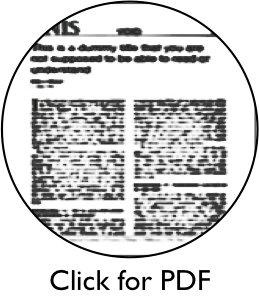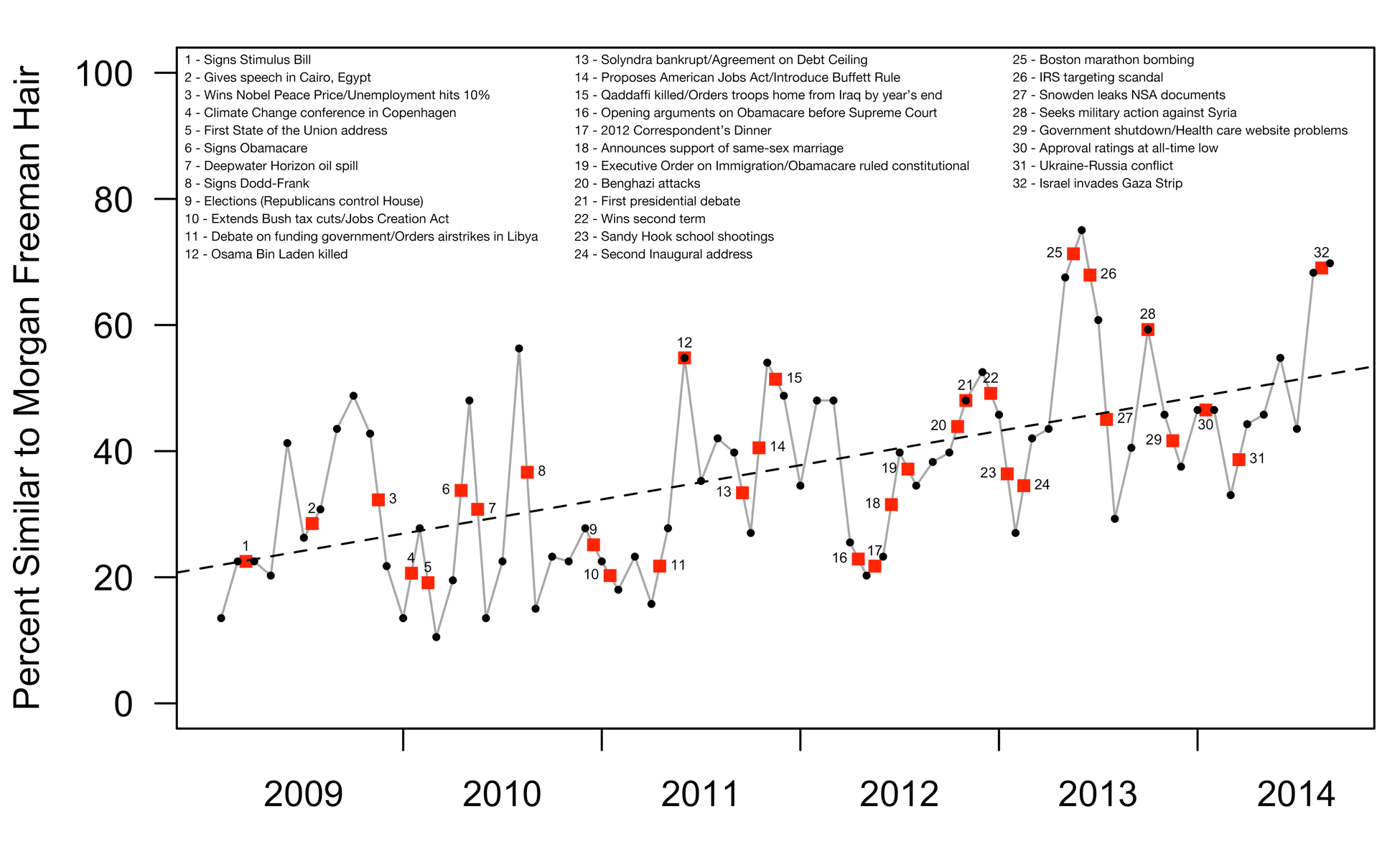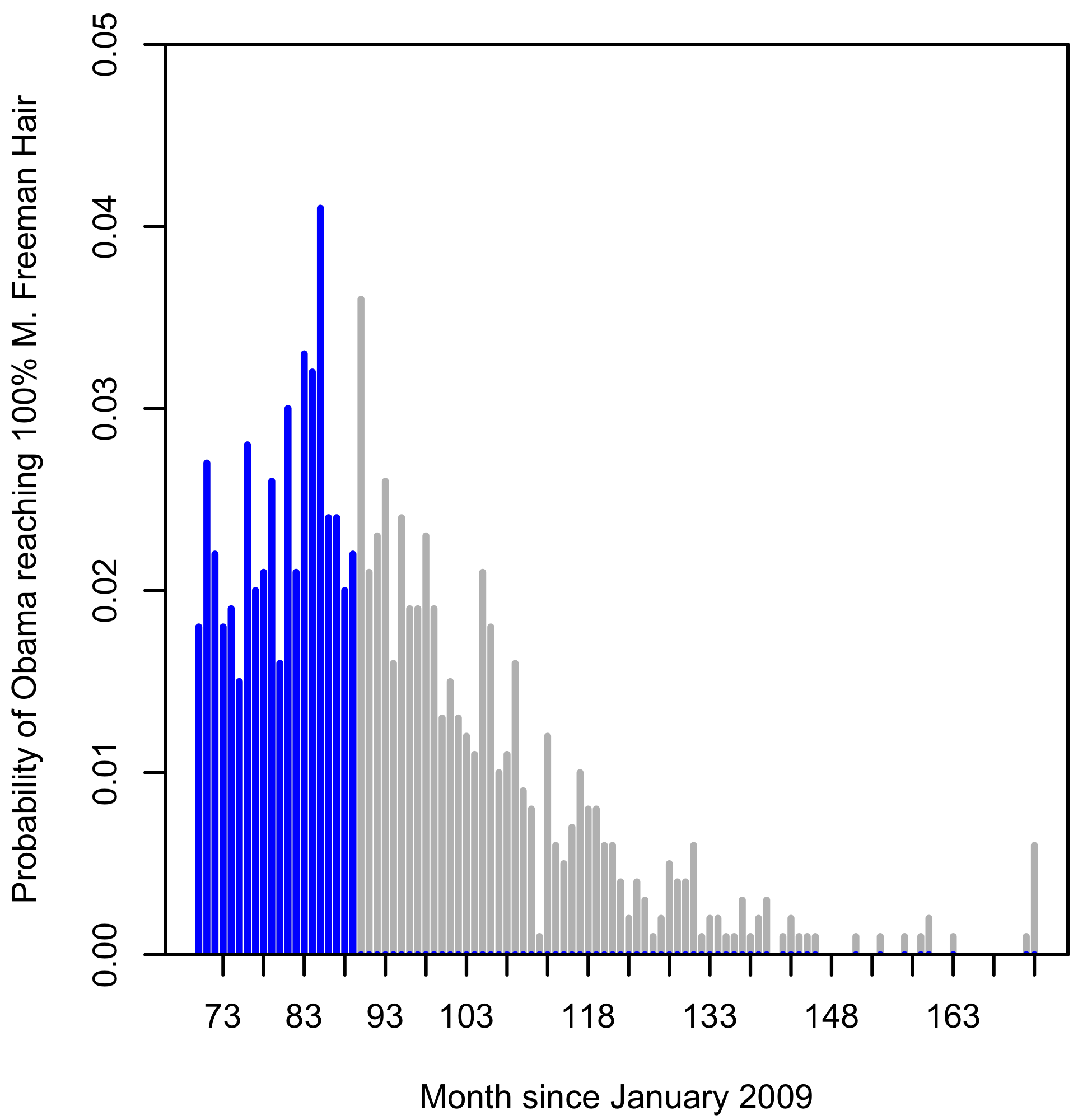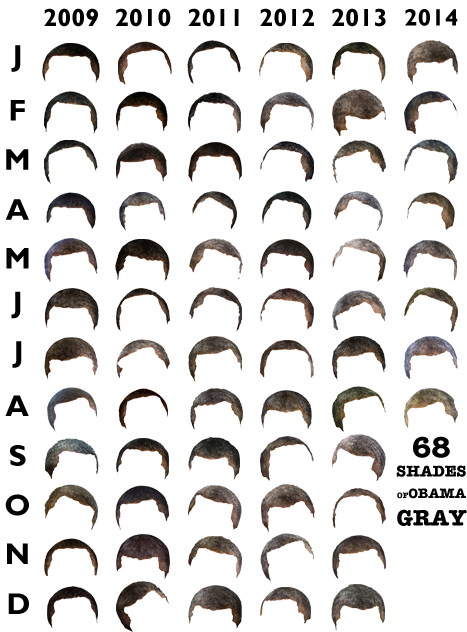
Tweet
September 25, 2014
Proceedings of the Natural Institute of Science | Volume 1 | HARD 3
Yes We Canities! A quantitative analysis of the graying of Barack Obama's hair
K. Hernandez1 and C. Drexler1
1 - Department of Gray-Hair Rhymology

Introduction
On April 28, 2012, 50 year-old Barack Obama stood before journalists, celebrities, and politicians at the annual White House Correspondent’s Dinner (WHCD) in the Washington Hilton Ballroom to deliver the event’s opening remarks. He mocked Donald Trump, teased members of Congress, and prodded Hilary Clinton for her recent forays into drinking and dancing before turning the roast on himself. As a picture of a youthful, dark-haired Obama appeared on screen, Obama said, “Four years ago, I looked like this.” The picture changed to a weary, graying Obama. “Today, I look like this,” he continued, “And four years from now, I will look like this,” as the screen now showed a photo of a resplendently white-haired Morgan Freeman. “That’s not even funny,” the president said amid the laughter in the ballroom.
Articles on the progressive graying of Obama’s hair had started to appear as early as just -5 (yes, negative 5) days into his administration (Hajduch 2009)[1]. Running up to the 2012 WHCD, these articles began appearing as frequently as the actual gray hairs on Obama’s head (e.g., Crone 2010, Felsenthal 2011), and even the headliner of the previous year’s WHCD, Seth Meyers, ribbed Obama and his increasingly peppered hair. The seminal article on the topic seems to be Helen Cooper’s piece in the New York Times (2009) and includes the ostensibly ass-pulled statistic that US Presidents age 2 years faster than other Americans[2].
However, other than providing a gallery of Obama photos over time, none of these articles attempt to quantify the rate at which Obama has grayed since taking office. The goal of this paper is to use monthly photos of Barack Obama to determine how fast he has transformed from “man with energy” to “man with experience”. We also tested Obama’s own prediction that in four years from the 2012 WHCD, his hair will resemble Morgan Freeman’s.
Methods
We obtained photos of Barack Obama taken every month from January 2009 until August 2014. Most of these photos came from The White House’s Photostream on Flickr and this Washington Post slideshow. URL’s for all photos are provided in the Appendix at the end of this paper.
For each month we chose a photo that was: 1) taken indoors, 2) showed Obama in focus, and 3) showed a frontal view of Obama’s face. We only chose indoor photos as a way to control for the effects of lighting (although we acknowledge that we couldn’t completely control for this effect).
For each photo, we used the magnetic lasso tool in Adobe Photoshop to select Obama’s hair. We then obtained the Median Gray Value of the selection, using the Record Measurements tool. This Gray Value is a measure of brightness, and ranges from 0 (dark, or ‘black hair’) to 255 (bright, or ‘white hair’).
We also conducted this analysis for four photos of Morgan Freeman from 2012 (see Appendix for Morgan Freeman’s Gray Values). We then divided each measurement of Obama’s Median Gray Value by the average of these four Morgan Freeman Median Gray Values. The result was a number that represented how similar Obama’s hair was to Morgan Freeman’s at any given month. We represent this number as a percentage (e.g., a value of 100% means that Obama’s hair is exactly similar to Morgan Freeman’s). These values are given in the Appendix.
Results and Discussion
Just by looking at photos of Obama’s hair over time, we can conclude that he is indeed getting grayer (Figure 1).
For a more quantitative perspective, we point you towards Figure 2, which shows that Obama’s Median Gray Value (as a percentage of Morgan Freeman’s hair) has been steadily rising since he took office. We annotated Fig. 2 with important events that occurred throughout Obama’s presidency. Initially, we wanted to look for associations between these events and the fluctuations in Obama’s hair color. But then we realized that any day during Obama’s presidency is likely filled with so many stressful events that it would be difficult to attribute a rise in grayness to any single one of them.

We fit a trendline to this data (dotted line in Fig. 2), and found the slope to be 0.452, meaning that Obama has gotten 0.452% closer to Morgan Freeman’s Hair every month since taking office. In January 2009, we estimate that Obama’s hair was 22% similar in color to Morgan Freeman’s, and that in August 2014 his hair was 52% similar to Morgan Freeman’s. Thus, Obama has gotten about 136% grayer since becoming president.
If we extrapolate this trendline to the 89th month of his presidency (which corresponds to May 2016, or about fours years from the 2012 WHCD when Obama made his prediction), we estimate that his hair will only be about 61.7% similar to Morgan Freeman’s. Thus, we predict that President Obama’s prediction will be wrong; cue Republicans snorting “typical”.
Or will it? You can see in Figure 2 that the grayness of Obama’s hair fluctuates quite a bit from month to month. The source of these fluctuations comes from some combination of: the differential lighting in the photos, error associated from measuring Gray Values in Photoshop, and whether or not Obama recently had a haircut. We can expect that Obama’s hair color (or, at least, Obama’s hair color in photos) will likely fluctuate in the future. Thus, it may be the case that we will perceive Obama to have 100% Morgan Freeman Hair (MFH) some time before May 2016, simply due to one of these fluctuations (i.e., Obama having a bad gray-hair day).
We can determine the probability that Obama will have reached 100% MFH before May 2016 by simulating this data into the future. More specifically, we can run 1,000 simulations of future Obama hair color (or, lack of color) that are based on our trendline as well as the size of the fluctuations present in the data[3]. Then, for each of the 1,000 simulations, we can find out the earliest month in which we observed Obama’s hair reaching 100% MFH.

Figure 3 shows the probability of Obama reaching 100% MFH in any month in the future. For example, there is just less than a 2% chance (= 0.02 probability) that Obama will reach 100% MFH in Month 70 of his presidency (i.e., October 2014). To determine if Obama will reach 100% MFH by the 89th Month (i.e., the month in which he said he would look like Morgan Freeman), we simply add up all the probabilities up to Month 89 (i.e., all the blue lines in Fig. 3). This adds up to 0.513. In other words, there is about a 51% chance that Obama’s hair will have resembled Morgan Freeman’s by the time he said it would. Odds are, Obama is right. And if this recent run of bad news continues, he may reach 100% MFH sooner than he thought.
Appendix (only available in pdf copy)
Raw Data for Barack Obama and Morgan Freeman. Median Gray indicates median gray value of hair obtained from Photoshop. % MF the percent similarity to the gray value of Morgan Freeman’s hair in 2012. Source contains URLs of photographs used for analyses (click for links).
Zipped File of all Obama hair crops used in study (click here)
Footnotes
[1] In fact, during the election, there were reports that Obama was actually dying his hair gray in order to appeal to more voters (NY Magazine 2008). [Return to main text]
[2] Olshansky (2011) confirms the ass-pullitude of that statistic. [Return to main text]
[3] More, more specifically: we used a first-order autoregressive model. For our value of temporal autocorrelation, we used the first-order level of temporal autocorrelation in the dataset, which was 0.465. For our estimate of the standard deviation of the normal distribution from which random numbers were drawn, we used the standard deviation of the data, which was about 15. [Return to main text]

Proceedings of the Natural Institute of Science (PNIS) by https://instsci.org/ is licensed under a Creative Commons Attribution-ShareAlike 4.0 International License.
